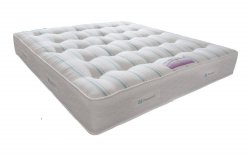Sales line (01507-611065) open : Monday - Friday, 9.30am - 5.15pm.
9 Tips To Sleep Comfortably During The Summer Months

During the summer months, the warmer weather is usually a welcome addition, especially when we're lucky enough to get a hot weekend to enjoy a BBQ, beach trips and fun in the garden.
Enjoying the sun is something that we look forward to, however for some, it can make a huge impact on our sleep come night time.
Sleeping when the weather is warmer can be difficult. Many of us struggle to fall asleep if our body temperatures are too high, resulting in a restless nights sleep when we do eventually drift off.
Natural Ways To Reduce Snoring

To some people it's a bit of a joke. For many, it's the source of endless nights of frustration. We're talking, of course, about snoring.
If you're a snorer, or your nightly sleep is ruined by sharing a bed with someone who snores, you might be interested to note that 25th - 29th April is National Stop Snoring Week.
This annual event by the British Snoring and Sleep Apnoea Association aims to promote awareness of snoring and the idea that nobody has to suffer. So we thought we'd take this opportunity to look at some natural remedies for snoring.
The Relationship Between Sleep and Weight Loss

It's January, and alongside all your other dreams for 2016, one of your resolutions will probably be that this is the year you're going to lose weight and get fit.
But did you know that getting enough sleep each night can really help with your fitness goals?
Which means having a lie in instead of an early morning gym session is actually better for you! Well, maybe not...
However, according to research, people who get around 8 hours sleep a night can reduce their stress levels and have double the chance of slimming down, alongside many other health benefits.
The Research
According to a study carried out by researchers from Kaiser Permanente Center for Health Research in Portland US, people who had less than six hours sleep or more than eight hours sleep per day were less likely to lose weight. The results support previous research linking sleep problems to obesity.
However, this does not mean that a poor sleep pattern directly causes obesity, but if a candidate wasn't getting enough sleep, it was harder for them to stick to their weight loss programme.
Lack of sleep can trigger a hormonal reaction which results in an intake of energy-dense food – usually high carb and high sugar foods, which become a “coping behaviour”.
We've all been too tired to cook a healthy meal and reached for a takeaway menu instead, or needed an energy boost so grabbed a chocolate bar or energy drink. Once or twice alongside a healthy lifestyle is fine, but if you constantly find yourself doing this, that is where the problem starts.
6 Health Benefits Of Sleep (According To Science)

Everyone knows that you need sleep. And there are few better feelings in life than sinking into a comfortable bed after a long and tiring day.
But for many people, sleep isn't a priority. The thing is, it should be. There are many health benefits of sleep, so not getting enough can take its toll on your body.
We've pulled back the covers on some of the key advantages of sleep, by looking at some studies and scientific evidence that support each claim.
Shift Work Sleep Disorder: How To Sleep When You Work Nights

If you work shifts, you probably know how hard it can be to sleep. You might well have suffered from lack of sleep, or at least found yourself struggling to nod off when it's bright daylight outside.
What you might not realise is that there's actually a real condition associated with shift work and sleep patterns. It's called Shift Work Sleep Disorder (SWSD), and it can be a nightmare (excuse the pun) for anyone who suffers.
If you regularly find yourself unable to sleep, or you're simply a shift worker looking for some tips on how to sleep better and avoid SWSD, this is the post for you.
Keep reading to find out what the signs of Shift Work Sleep Disorder are, who's most at risk, and how you can avoid it.



















